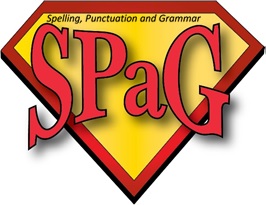

To create a successful piece of writing, using the correct grammatical structures and punctuation is essential. Students and staff are expected to have high expectation with regards to correct spelling, punctuation and grammar in all lessons. We are passionate about enabling students to write with flair and creativity, judiciously choosing from a bank of unrestricted vocabulary, free from spelling and grammatical restraints.
It is widely assumed that the primary role of letters in English is to represent sounds, and the many ‘exception’ words’ are generally taken to reflect a poorly designed spelling system. In fact, the English spelling system is designed to encode both pronunciation and meaning of words, and as a consequence, English word spellings are constrained by phonology, morphology and etymology.
- J.Bowers and P.Bowers
Why is Spelling, Punctuation and Grammar so important?
|
|
This sentence has five words. Here are five more words. Five-word sentences are fine. But several together become monotonous. Listen to what is happening. The writing is getting boring. The sound of it drones. It’s like a stuck record. The ear demands some variety. Now listen. I vary the sentence length, and I create music. Music. The writing sings. It has a pleasant rhythm, a lilt, a harmony. I use short sentences. And I use sentences of medium length. And sometimes, when I am certain the reader is rested, I will engage him with a sentence of considerable length, a sentence that burns with energy and builds with all the impetus of a crescendo, the roll of the drums, the crash of the cymbals–sounds that say listen to this, it is important.
- Gary Provost
Rationale
At Ashton Community Science College, we firmly believe that good spelling is essential in order for children to communicate effectively, not only in all areas of the curriculum, but also in their everyday lives. We particularly want children to develop a love of language and the confidence to spell more challenging and ambitious words. In allowing them opportunities to develop a rich and exciting vocabulary, we are enabling them to become effective communicators.
As a school, we aim to adopt a consistent approach to the teaching of spelling. In doing so, we aim to:
|
|
Our approach
Students in Year 7 first complete the Blackwell’s baseline spelling test to determine their spelling age.
Building on this, students will receive a weekly spelling homework which they will be tested on in class. These groups of words are based around common spellings rules, errors and contain words that can apply to subjects across the curriculum.
In addition to their weekly spelling test, students are also asked to complete a short writing task based on one of their key words in order to enhance understanding and utilise spellings in writing.
They are encouraged to take inspiration from their current learning, in each subject, so they can relate the spellings to material that is meaningful and relevant to them.
Spelling strategies
Phonics and the correspondence of letters and sounds underpins all learning of spelling in school. There are other strategies which the children are encouraged to use and which might be useful if you are helping your children at home. These include: -
- Look, say, cover, write, check
- Identifying syllables in words
- Drawing symbols or images to represent the word or spelling rule
- Using root words/word families e.g. smile, smiling, smiled
- Looking for words within words e.g. ear within hear
- Using words already known to spell new words e.g. would, should, could
- Mnemonics e.g. big elephants can always upset small elephants=because
- Learning different spelling rules (e.g. cross out the y and add ies for plurals)
- Linking handwriting and spelling-muscle memory
Spelling Passport
Spellings Term 1a
Spellings Term 1b
Spellings Term 2a
Spellings Term 2b
Spellings Term 3a

